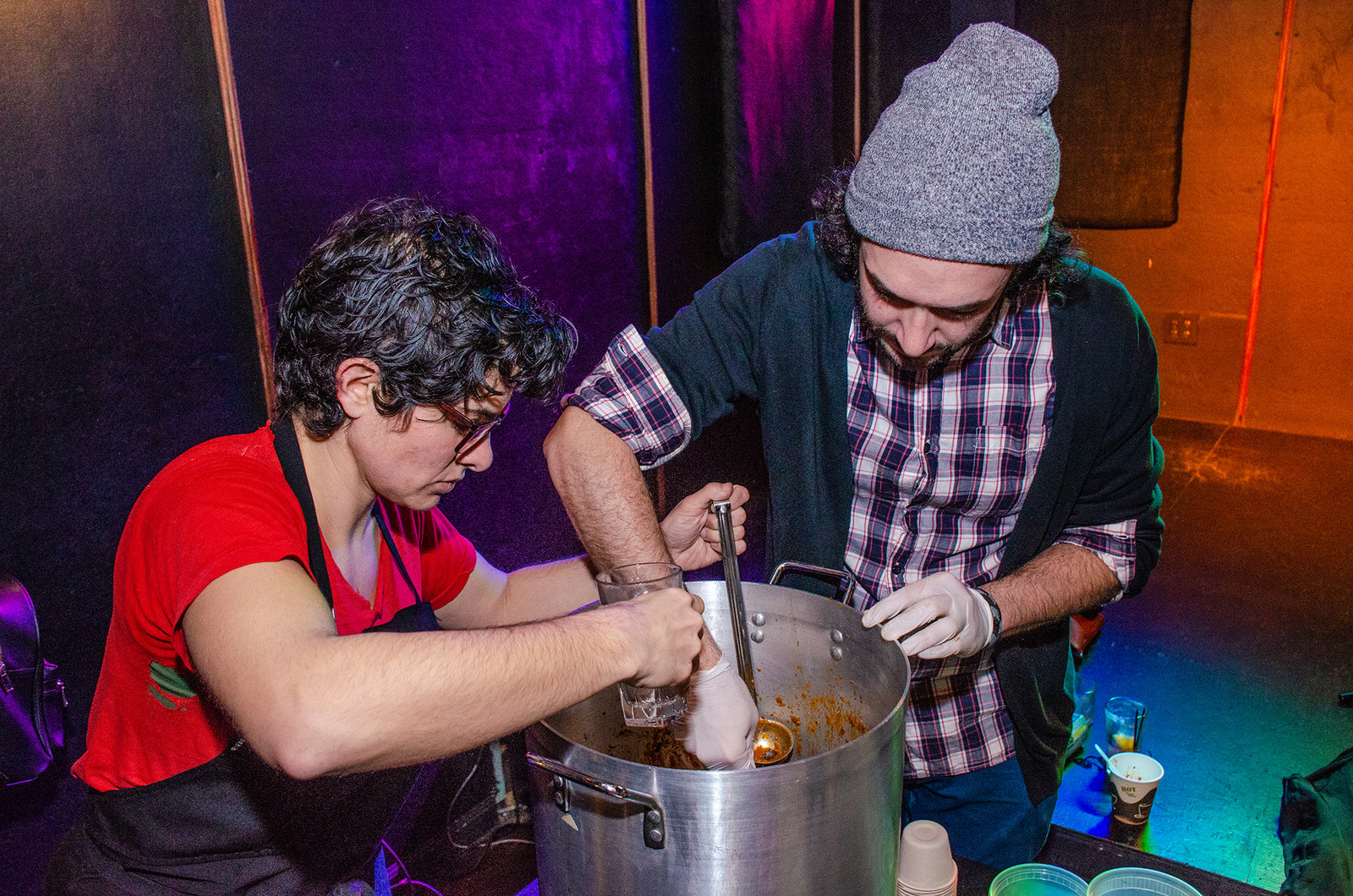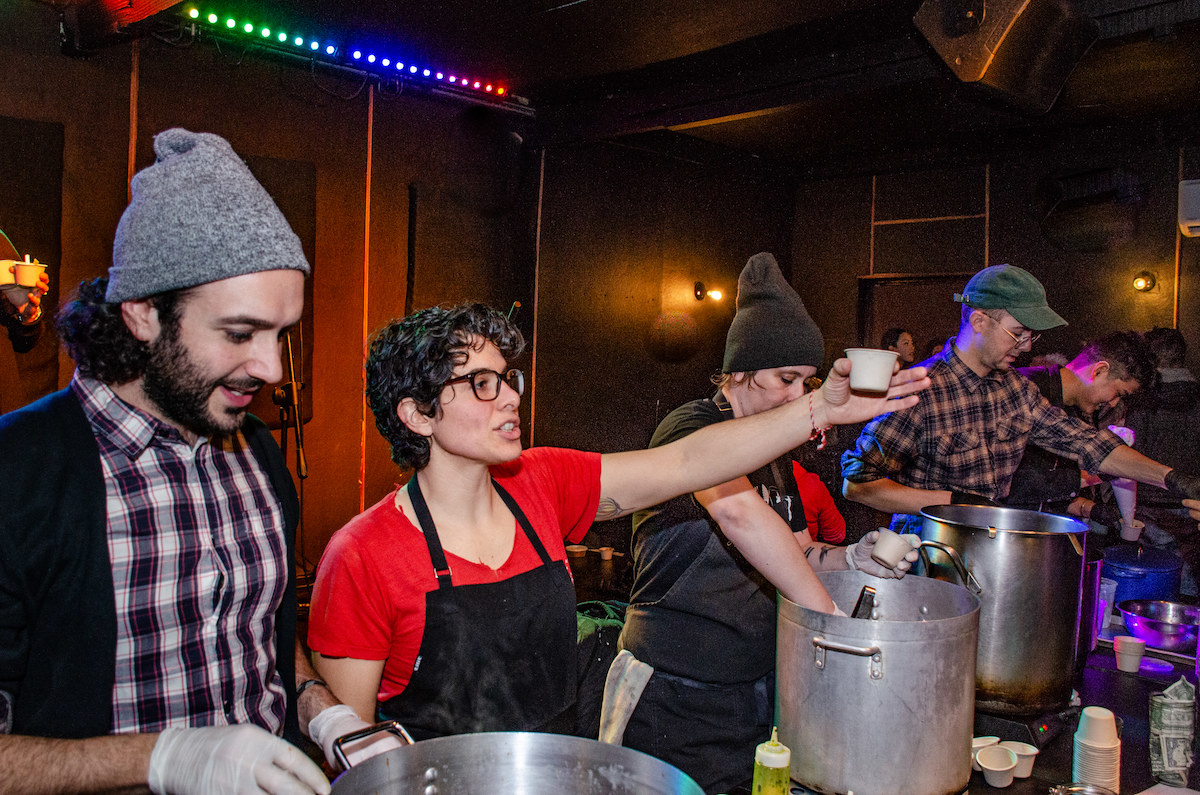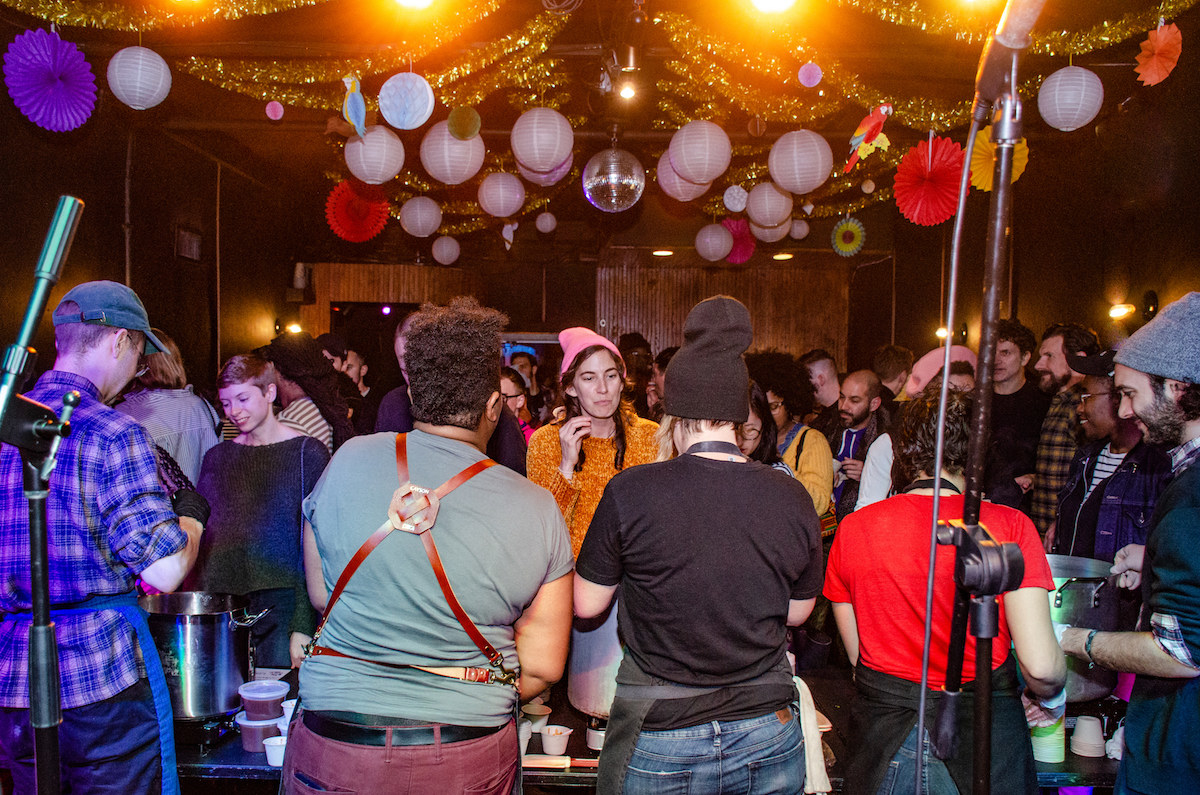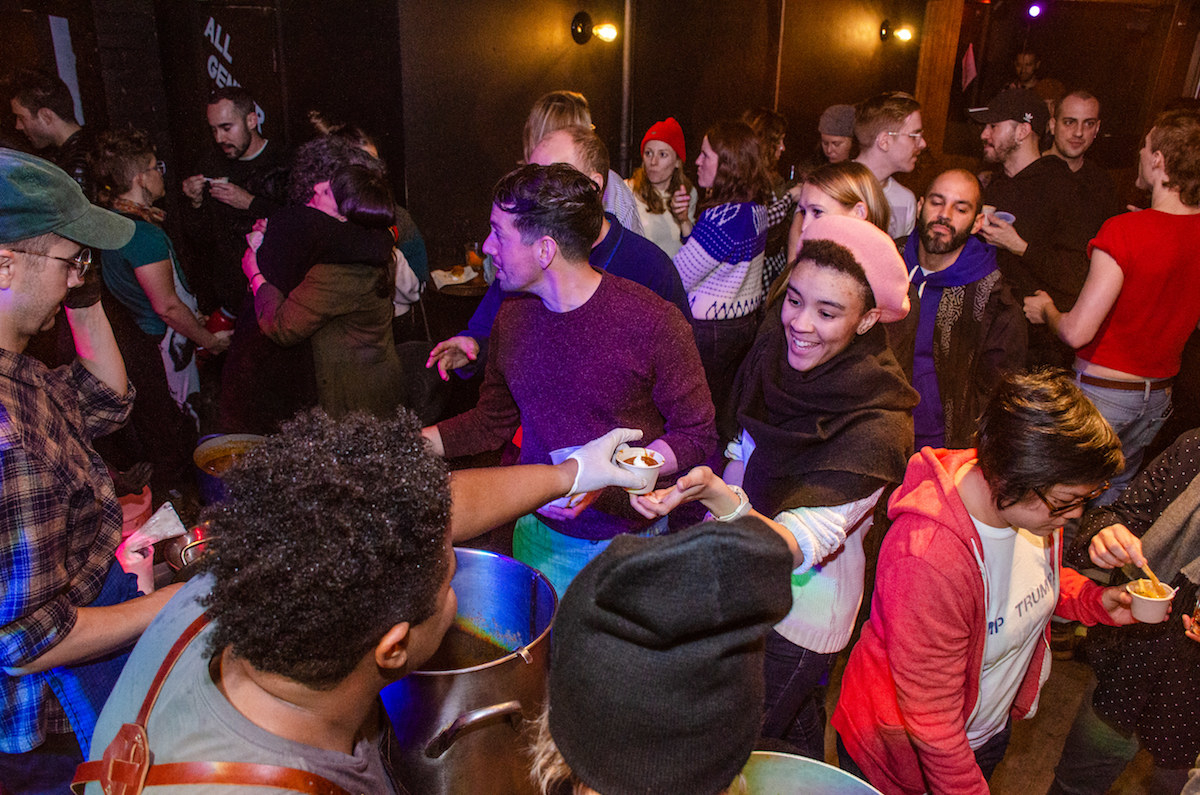Welcome to Cooking Up Change, a series in which BuzzFeed food writers sit down with some of our favorite cooks to talk about how they are using food to ignite change.

In 2017 I moved to New York City, leaving behind a five-year relationship, my friends, and my family. Like so many people, I found New York City made me feel alone, and the thing I missed most about my old life was the endless support my family provided. This is when I discovered Queer Soup Night and found a new type of family. A family that provided the same love, advice, and guidance as my own.
Queer Soup Night is a “Brooklyn-born” party with soup and community at its core. It was founded by Liz Alpern and a group of her friends during the wake of the 2016 election, when the future felt especially uncertain for members of the LGBTQ+ community. Alpern wanted to create a space dedicated to fundraising and resistance, and used what she knew best to make it happen: food. “I tried out many different avenues to get involved, but didn't find the right fit. I realized that I needed to do what I know how to do best,” says Alpern. “That is bringing people together, throwing parties, and making a lot of food — and that's how the concept of Queer Soup Night as a fundraiser for local organizations came about.”
Every Queer Soup Night centers around soups prepared by queer cooks. These creations range from Yemenite chicken soup to hearty chili, and they’re prepared by a range of talented individuals, from food editors to restaurant chefs to caterers. Money is collected and donated to various nonprofits — and since its launch in 2017, Queer Soup Night has raised over $30,000 for community organizations, hosted 28 events in 9 different cities, and given queer communities a safe and supportive space to come together. Each event provides both physical and emotional nourishment for the LGBTQ+ community. “Soup is that comfort food that makes you feel nourished and at home,” says Alpern. “It’s what you eat when you’re sick, when someone is taking care of you.”
“Soup is that comfort food that makes you feel nourished and at home.”
Queer Soup Night also stands as a unique entity within the LGBTQ+ events landscape. While alcohol is often served, it's not the social glue that holds the event together. The music is kept at a quieter level, and the crowd is diverse, welcoming, and eager to connect. While individuals who typically reject queer nightlife, for various reasons, may struggle to find their community, Alpern’s event embraces all with open arms, love, and a warm bowl of soup.
BuzzFeed caught up with Alpern to talk about Queer Soup Night, her career, and how she is building community through food.
Thanks so much for chatting with us! What inspired you to start Queer Soup Night?
Liz Alpern: In the wake of the 2016 election, there was a real feeling that those of us who were upset by the results of the election needed to join the resistance and wake up to what we essentially let happen. We felt like we needed to fight some of the destructive policies that felt imminent. I was interested in finding a way that I could get involved in resistance work.
During that time period, and still now, it felt very threatening and scary as a queer person, so it felt really important to be surrounded by my queer community. I wanted to be protected by them, and protect them. The idea of combining fundraising with the queer community felt like the right cross section of opportunities for me.
Why did you choose soup as the centerpiece of the event?
LA: I have always loved what soup symbolizes. Everyone can throw something into the pot. You use your scraps, your odds and ends, and you come out with something much more robust than its parts. Soup is a nice symbol of what it looks like when we all contribute and create something bigger.
Soup also allows us to highlight foods from many different cultures. I love the idea of nourishment and people being able to share their cultures and backgrounds and food through the medium of soup.

That makes so much sense. Soup is nourishing in both an emotional and physical way, so it's the perfect food to fuel resistance.
LA: I think so! And when we started it, people really needed that hug. They needed that warm bowl of soup. People still need it, but they really needed it then. It just felt so natural.
Tell us about the fundraising aspect of Queer Soup Night. How do you choose which partners you work with?
LA: We have a few metrics in which we choose the organizations that we work with. The first is that the organization needs to be local. The Oakland chapter is fundraising for Oakland, and the Chicago chapter is organizing for Chicago. One of our bigger principles centers around growing local queer communities. Change happens from knowing the people around us.
We also try to choose organizations that would benefit from the donations that we make, which is usually between $700 to $3,000, so we try not to choose organizations that are too big. We really want to make sure our donations make an impact. We also don't strictly work with queer organizations, but we want to work with organizations that tackle issues that are important to the queer community.

Queer Soup Night is not your full-time job. Tell us about your company, the Gefilteria. What are some of its missions?
LA: My company, the Gefilteria, started in 2012 with a very clear mission of revitalizing and reimagining old-world Jewish foods. We saw Ashkenazi Jewish food kind of being ridiculed and becoming foods that our generation was no longer interested in making. They were seen as relics and foods you make for the sake of nostalgia. A lot of people didn’t know how to make them, and a lot of the places you could go eat them at were closing. Our goal was to inject some new life into the food and make it relevant for the next generation. We wanted to give it an opportunity to shine like we knew it should.
It seems like the big-picture goals of both the Gefilteria and Queer Soup Night are somewhat similar.
LA: I make a joke that I’m obsessed with identity work. Part of my day is having deep conversations about schmaltz and matzo balls, and the next is talking soup with a bunch of queer chefs and getting into what queer community means to them. I feel like all I ever do is talk about my identity. I think we thrive when we feel grounded in community and our identities. I don't think it’s a coincidence that I’ve focused my work on the communities from which I have sprung.
So you run a business, are a program manger for Fair Food Network, and you’ve written a cookbook — among many other things. How do you find time to run Queer Soup Night, especially as it continues growing?
LA: Queer Soup Night has grown in ways that we could have never imagined. The good thing is that we learned how to run the party early on, so the events themselves are fairly manageable. Growing as an organization has been hard at times. One of the things that we are doing now is finding ways to get more people involved and keep growing without the bulk of the work falling on only a small number of people’s shoulders. Integrating people we don’t know well and integrating people who are not my friends is a new job.
I want to give a shoutout to everyone who shows up and donates time and energy to making these events work. From greeting people at the door to spreading the word, Queer Soup Night is growing because of the generosity of everyone who attends. I am truly grateful for everyone who has been involved.

Why do you think it’s important for there to be queer-centric events within the food world?
LA: I think that it can be really easy to get lost in the hustle-bustle of the food world. I think that in order to thrive, we need to be part of networks and be connected to one another. Knowing that someone is queer and wants to be involved with something like Queer Soup Night means that they share similar values about the kinds of things that are important to them. It gives you a really good starting point for building that network.
One of our missions is that we really want to lift up queer chefs. A lot of the people we work with are not the executive chefs of restaurants. They are sous chefs or caterers — not necessarily people in the limelight. We are interested in giving these chefs the opportunity to step into the spotlight, too.
One thing I love about Queer Soup Night is that it doesn’t fall into the tropes that other LGBTQ+ events sometimes do. Alcohol is often served, but it’s not the social glue that holds the event together. As an extreme introvert, I always felt welcomed.
LA: Not centering around alcohol was central to the concept from day one. I think it’s really important for there to be events where drinking isn’t the center. When we think about building community, besides drinking, what can we do together? Well, we can eat! Not everyone can afford to go out to a fancy dinner with friends, so what does it look like for a bunch of queers to eat together without spending a ton of money? Well, this is what that looks like! The idea of making it accessible financially while not centering around alcohol was absolutely intentional.
We also just wanted to be super friendly. Many LGBTQ+ parties can be really cliquey, and we have tried really hard to make the environment welcoming. We try to always have greeters, welcome everyone with a smile, and make it a space where people feel comfortable introducing themselves.
From your perspective, what makes the queer food community so special?
LA: The generosity makes it so special. Every direction I turn, help is right there from the community. It is such an uncompetitive environment. I have experienced this feeling similarly with the community of Jewish food folks that I've connected to. We are similarly noncompetitive, and we all talk about how lucky we are to be in this time and place in history. There is room for all of us.

What does the future of Queer Soup Night look like and how can people get involved?
LA: Queer Soup Night will continue to grow and expand into other cities. We are going to continue to have partnerships and host events that highlight the community, social justice, and queer chefs all over the country.
If anyone wants to get involved in a city that there is currently Queer Soup Night, the best thing you can do is show up, donate, and share information about our events with your friends in cities where parties are happening. We want all of our chapters to thrive and be filled with beautiful queers who want to donate and are happy to be part of it. If you want to get involved beyond that, the best way to do so is by emailing queersoupnight@gmail.com. ●
This interview has been edited for length and clarity.
You can follow Queer Soup Night on Instagram, Facebook, and their website, and you can follow the Gefilteria on Instagram and Facebook, and see a list of vendors you can purchase their products from via their website.

